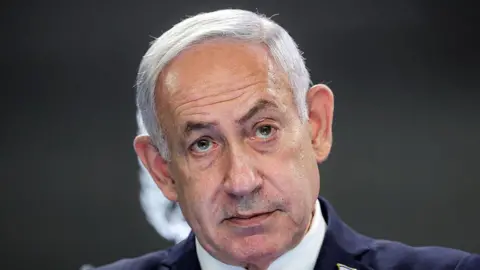### Summary of Latest Developments in Gaza Hostages Negotiation
In recent updates from the ongoing conflict in Gaza, Israeli Prime Minister Benjamin Netanyahu has indicated a shift in negotiation strategies concerning the hostages held by Hamas. During an interview, he hinted that current discussions are aimed towards a comprehensive agreement that would result in the simultaneous release of all hostages. This represents a significant strategic adjustment from the previously discussed 60-day ceasefire that aimed for a phased release of hostages and some humanitarian aid.
### Hostage Negotiations and Mediated Talks
Hamas has dispatched a delegation to Cairo to engage in preliminary discussions with Egyptian officials, as mediators look for an avenue to push through a potential agreement. Sources indicate that there is a growing perception among mediators that a window of opportunity may open in the upcoming weeks which could facilitate reaching a deal. Israel’s military operations have been intensifying, particularly in Gaza City, raising concerns about the humanitarian situation and the fate of the remaining hostages.
### Military Operations and Strategic Goals
Following a breakdown of indirect negotiations last month, Israel announced its intentions to escalate military operations to reclaim control of all areas within the Gaza Strip, a region that is currently home to approximately two million Palestinian residents. Reports suggest that despite the planned military actions likely commencing in October to allow for military preparations, recent attacks have already ramped up. Witness accounts detail intense air strikes resulting in civilian casualties, including tragic incidents in which families, including children, were killed.
### Pressures on Netanyahu and the Hostage Situation
Prime Minister Netanyahu is facing increasing pressure domestically to secure the release of hostages, particularly in light of the ongoing military expansion. Reports also suggest that regional powers, specifically Egypt and Qatar, are devising a new framework aimed at facilitating the simultaneous release of hostages in exchange for a cessation of hostilities. However, the complexity of demands—including disarming Hamas and relinquishing control over Gaza—has raised doubts regarding whether such negotiations could succeed in a timely manner.
### Hamas’ Stance and Broader Implications
Hamas, for its part, maintains that any comprehensive agreement must include the exchange of hostages for Palestinian prisoners held in Israeli jails, a full withdrawal of Israeli forces, and the end of the ongoing conflict. Moreover, Hamas has been adamant about not disarming unless a sovereign Palestinian state is established. Netanyahu’s statements indicate a hardline stance, asserting that Israel will not compromise its security or plans and expressing a vision for Palestinians to emigrate voluntarily.
Humanitarian concerns grow increasingly dire, with the UN warning of a looming famine in Gaza due to restrictions on aid and resources. Reports of malnutrition and starvation rates climbing to unprecedented levels signal a worsening humanitarian crisis. The international community has vocalized concerns regarding potential violations of human rights laws associated with any forced displacements akin to historical traumas deemed the “Nakba,” or catastrophe, when many fled their homes during the establishment of Israel.
### Continuing Developments and Global Reactions
The situation remains fluid, with European nations alongside the United States closely monitoring developments and calling for accountability amid growing humanitarian crises. Netanyahu’s aggressive military tactics coupled with rhetoric around hostage negotiations paint a complex picture with numerous lives hanging in the balance, as both local and international stakeholders navigate this deeply entrenched conflict. The repercussions of the ongoing violence not only affect those in Gaza but also resonate across the region, emphasizing the need for a durable and peaceful resolution that addresses the root causes of the conflict.











